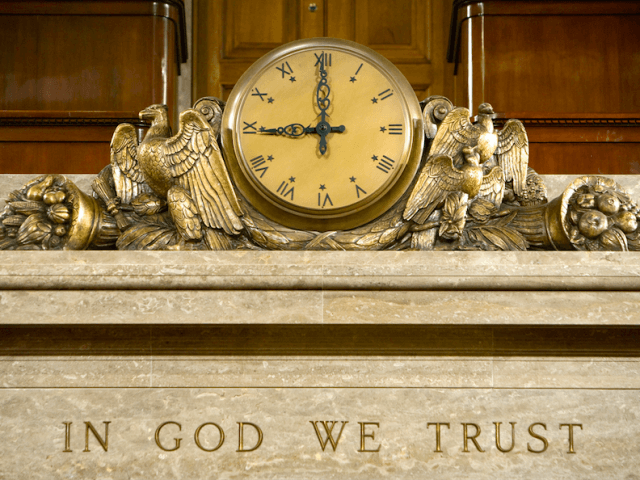On Tuesday night, the Anderson City Council voted unanimously to hang a sign reading “In God We Trust” in the city council chambers. The council stated that the display will be prominently featured and will remain permanent, according to Action News Now.
Anderson, population roughly 10,000, lies 10 miles south of Redding in northern California. The 2010 United States Census reported that the town was 83% white, and 4% Native American, Asian or Pacific Islander.
On July 11, 1955, President Dwight D. Eisenhower signed P.L. 84-140, requiring that “In God We Trust” be printed on all American paper currency, which started in 1957. U.S. coins had featured the phrase since the Civil War. On July 30, 1956, Eisenhower signed a bill establishing “In God We Trust” as the national motto.
In October 2011, after Barack Obama had mistakenly called “E Pluribus Unum” the national motto, the House passed a non-binding resolution by a vote of 396-9 reaffirming its status as the U.S. national motto. Democrats, including Obama, mocked the Republican-controlled House, saying it was wasting time.
In 1994, The Freedom From Religion Foundation sued the federal government in 1994 to have “In God We Trust” removed from currency and as the national motto. The organization has been attempting to remove the phrase ever since. On February 1, 2013, the Freedom From Religion Foundation joined 19 other plaintiffs to sue the U.S. Treasury. It demanded U.S. coins and paper money no longer feature “In God We Trust,” arguing its use constituted “discrimination” against non-believers.
The phrase’s use in American history dates back to long before the Civil War. The Francis Scott key poem that inspired the Star Spangled Banner, written during the War of 1812, featured the phrase. The fourth stanza of the lyrics contains this passage: “Then conquer we must, when our cause is just, And this be our motto: ‘In God is our trust.’”
The use of the phrase on U.S. coinage was triggered by a November 13, 1861 letter from a Baptist minister from Ridleyville, Pa., the Rev. Mark R. Watkinson, who wrote to Salmon P. Chase, President Abraham Lincoln’s Treasury Secretary. Watkinson argued that there should be “the recognition of the Almighty God in some form on our coins.”

COMMENTS
Please let us know if you're having issues with commenting.